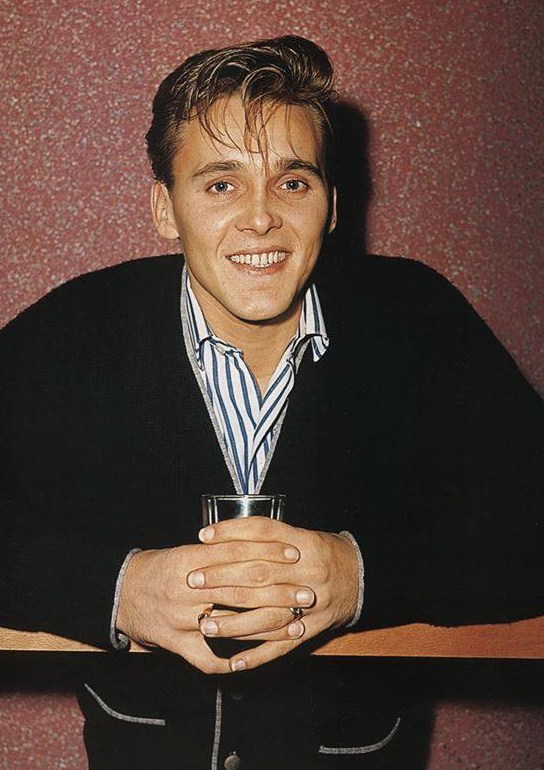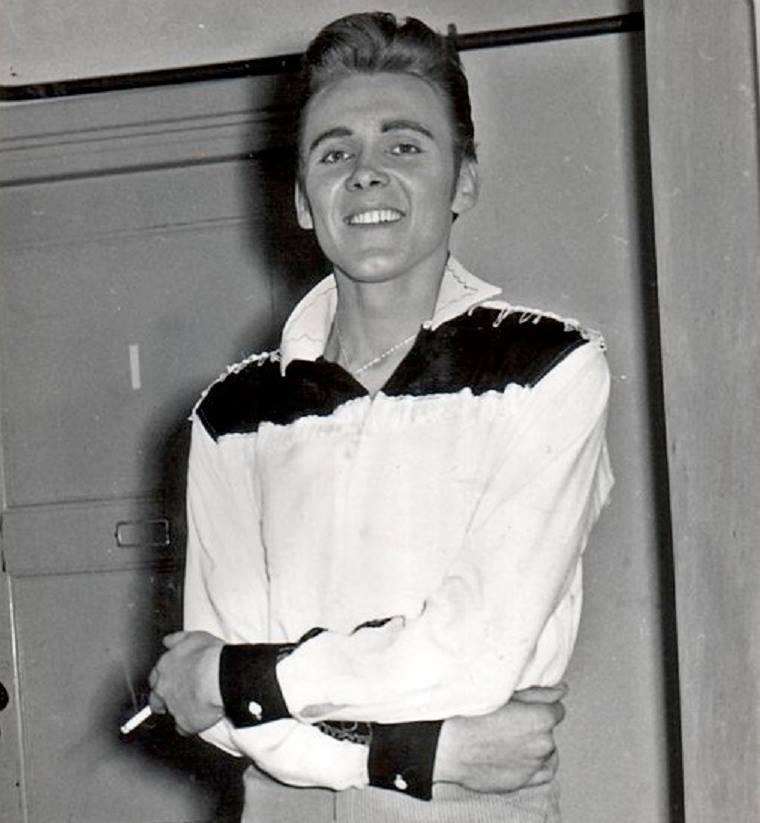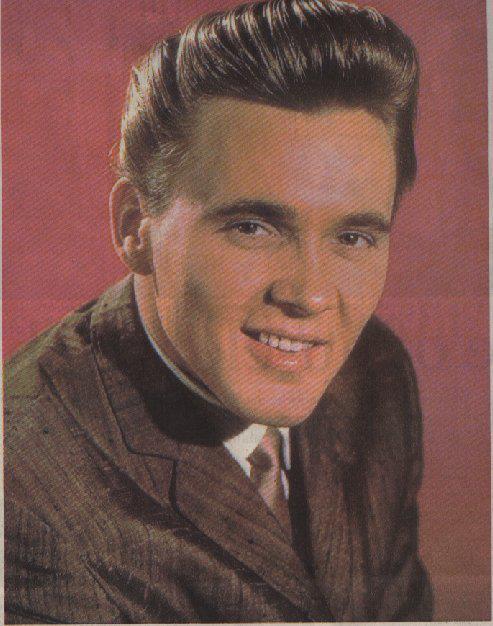BIOGRAPHICAL DETAILS
Full Name: Ronald William Wycherly
Description: Vocalist, UK
Known For: First album “The Sound Of Fury” (1960)
Instruments: Voice, Guitar
Music Styles: Rock , Easy listening, Rockabilly
Location: United Kingdom
Date Born: 17 April 1940
Liverpool, Lancashire, England
Date Died: 28 January 1983 (aged 42)
Paddington, London, England
Cause Of Death: Heart Disease
CONTACT DETAILS
Web Site:‘Sound of Fury’ fan club
Other Links: See below:
YOUTUBE VIDEO
BIOGRAPHICAL PROFILE
Billy Fury
An English singer.
One of England’s top singers, pre Beatle era.
Ronald Wycherley, known as Billy Fury (17 April 1940 – 28 January 1983), was an internationally successful English singer from the late 1950s to the mid 1960s, and remained an active songwriter until the 1980s. Rheumatic fever, which he first contracted as a child, damaged his heart and ultimately contributed to his death. An early British rock and roll (and film) star, he equalled the Beatles’ record of 24 hits in the 1960s, and spent 332 weeks on the UK chart, without a chart-topping single or album. Allmusic journalist, Bruce Eder, stated, “His mix of rough-hewn good looks and unassuming masculinity, coupled with an underlying vulnerability, all presented with a good voice and some serious musical talent, helped turn Fury into a major rock and roll star in short order”. Others have suggested that Fury’s rapid rise to prominence was due to his “Elvis Presley-influenced, hip-swivelling, and at times highly suggestive stage act.”
Wycherley was born at Smithdown Hospital (later Sefton General Hospital, now demolished), Smithdown Road, Liverpool. He commenced music lessons on the piano before he was a teenager, and was bought his first guitar by the age of 14. Wycherley fronted his own group in 1955, but simultaneously worked full-time on a tugboat and later as a docker. He entered and won a talent competition, and by 1958 had started composing his own songs. Wycherley first attended a concert at the Essoldo Theatre in Birkenhead, run by impresario Larry Parnes, in the hope of interesting famous singer Marty Wilde in some of the songs he had written. Instead, in an episode that has become pop music legend, Parnes pushed young Wycherley up on stage right away. He was such an immediate success that Parnes signed him, added him to the tour, and renamed him ‘Billy Fury’. However, his early sexual and provocative stage performances received censure, and he was forced to tone them down. In October 1959, the UK music magazine, NME, commented that Fury’s stage antics had been drawing much press criticism.
He released his first hit single for Decca, “Maybe Tomorrow”, in 1959. He also appeared in a televised play Strictly For Sparrows, and subsequently on Oh Boy! In March 1960, he reached No. 9 in the UK Singles Chart with his own composition “Colette”, followed by “That’s Love” and his first album The Sound of Fury (1960), which featured a young Joe Brown on lead guitar, with backup vocals by the Four Jays.
After securing more hits and jettisoning his band Georgie Fame and the Blue Flames, Parnes held auditions in Liverpool for a new group. Among those who failed were the Beatles, who at this time were still calling themselves the Silver Beetles. They were offered the job for £20 a week on condition that they sacked their bassist Stuart Sutcliffe. John Lennon refused and the band left after Lennon had secured Fury’s autograph. The Tornados were recruited as Fury’s backing band and toured and recorded with him from January 1962 to August 1963. The Puppets were another band that backed Billy on a couple of gigs for 12 months.
UK chart and film success
Fury concentrated less on rock and roll and more on mainstream ballads, such as “Halfway to Paradise” and “Jealousy” (which reached No. 3 and No. 2 respectively in the UK Singles Chart in 1961). Fury confessed to the NME that “I wanted people to think of me simply as a singer – and not, more specifically, as a rock singer. I’m growing up, and I want to broaden my scope. I shall continue to sing rock songs, but at the same time my stage act is not going to be as wild in the future”. It was Decca’s decision to mould Fury into a teen idol after his last self-penned song, “My Christmas Prayer”, had failed to chart. The years 1961 through 1963 were Fury’s best years chartwise. In 1962 Fury appeared in his first film, Play It Cool, modelled on the Elvis films. It featured Helen Shapiro, Danny Williams, Shane Fenton and Bobby Vee, who appeared with the Vernons Girls. The hit single from the film was “Once Upon a Dream”. There were other notable performances by several British actors and performers such as Richard Wattis, Lionel Blair and Dennis Price.
Fury’s We Want Billy! (1963) was one of the first live albums in UK rock history and featured renditions of his hits and cover versions of several R&B songs such as “Unchain My Heart”.
In 1965 he appeared in the film I’ve Gotta Horse, which also featured the Bachelors, Michael Medwin and Jon Pertwee. The album from the film was made available in stereo. Fury left Decca Records in 1966, after signing to a five-year recording contract with Parlophone.
Having had more UK hits, such as “It’s Only Make Believe” and “I Will” (written by Dick Glasser, not to be confused with the Paul McCartney song), both in 1964, and “In Thoughts of You” (1965), Fury began a lengthy absence from the charts in 1967, and underwent surgery for heart problems in 1972 and 1976 which led to his abandoning touring. Despite spending many weeks on the charts, Fury never achieved a number one single, but he remained popular even after his hits stopped. “I Will” became a US hit for Dean Martin (1965) and for Ruby Winters (1977).
Later years
In 1973, Fury emerged from a period of semi-retirement to star as ‘Stormy Tempest’ in the film That’ll Be the Day. Also starring David Essex and Ringo Starr, it was roughly based on the early days of the Beatles. Starr was from the Dingle area of Liverpool as was also Fury, and had originally played drums for Rory Storm & the Hurricanes, whom the Stormy Tempest group were said to be modelled upon.
In the mid-1970s Fury went out on the road with Marty Wilde. Away from the spotlight, he focused on wildlife preservation. Fury’s health deteriorated and he underwent two open heart surgeries – the first was in 1972, and the second in 1976. In 1978 he was declared bankrupt for unpaid taxes from the Inland Revenue. The unpaid taxes were dated back to 1962, and amounted to £16,780. He was also forced to sign over his royalties and publishing income. A new release, “Be Mine Tonight” (1981), failed to make an appearance in the UK Singles Chart. Worse was to follow in March 1981 when Fury, working on his own farm, collapsed and almost perished. He returned to touring later that year and his next two singles, “Love or Money” and “Devil or Angel”, just dented the UK chart. In 1981 and 1982, Fury was signed to Polydor Records by A&R man Frank Neilson and recorded a comeback album, The One and Only (released posthumously) with Shakin’ Stevens’ producer Stuart Colman. Due to his health, Fury did little touring to promote the new album. His last public appearance was at the Sunnyside, Northampton, on 4 December 1982, Fury recorded a live performance for the television show, Unforgettable, featuring six of his old hits although, at the request of his mother, only four of these were broadcast.
Personal life
Fury lived with Lee Middleton from 1959 to 1967. He married Judith Hall in May 1969, but later left her for heiress Lisa Voice (née Rosen). They lived together in London and sometimes on Fury’s farm in Wales, from 1971 until his death although they were leading separate lives for the last two years. Fury was a keen birdwatcher.
Death
After returning from a recording session in the early hours of 28 January 1983, Fury collapsed in his home in London. His personal manager Tony Read found him unconscious the next morning. He was rushed to St Mary’s Hospital in Paddington, but died later in the afternoon, aged 42. A week later his funeral was held at the St John’s Wood church in London, for which his body was embalmed by Desmond Henley. Among the mourners were Larry Parnes, Marty Wilde, Jess Conrad, Eden Kane, Tony Read, Hal Carter and Mick Green, in addition to family members, friends and fans. The choir sang a special version of Billy’s Decca hit “I’m Lost Without You”. After the service Billy was buried at Mill Hill cemetery. A track issued posthumously, “Forget Him”, became his final single chart hit.
Sadly Billy Fury died in 1983.
Singles include.
1959 “Maybe Tomorrow” / “Gonna Type A Letter”
1959 “Margo” / “Don’t Knock Upon My Door”
1959 “Angel Face” / “Time Has Come”
1959 “My Christmas Prayer” / “Last Kiss”
1959 “Colette” / “Baby How I Cried”
1960 “That’s Love” / “You Don’t Know”
1960 “Wondrous Place” / “Alright Goodbye”
1960 “A Thousand Stars” / “Push Push”
1961 “Don’t Worry” / “Talkin’ In My Sleep”
1961 “Halfway To Paradise” / “Cross My Heart”
1961 “Jealousy” / “Open Your Arms”
1961 “I’d Never Find Another You” / “Sleepless Nights”
1962 “Letter Full Of Tears” / “Magic Eyes”
1962 “Last Night Was Made For Love” / “A King For Tonight”
1962 “Once Upon A Dream” / “If I Lose You”
1962 “Because Of Love” / “Running Around”
1963 “Like I’ve Never Been Gone” / “What Do You Think You’re Doing”
1963 “When Will You Say: “I Love You”?” / “All I Wanna Do Is Cry”
1963 “In Summer” / “I’ll Never Fall In Love Again”
1963 “Somebody Else’s Girl” / “Go Ahead And Ask Her”
1963 “Do You Really Love Me Too?” / “What Am I Going To Do”
1964 “I Will” / “Nothin’ Shakin’”
1964 “It’s Only Make Believe” / “Baby What Do You Want Me To Do”
1964 “Hippy Hippy Shake” / “Glad All Over” [Export single]
1965 “I’m Lost Without You” / “You Better Believe It Baby”
1965 “In Thoughts Of You” / “Away From You”
1965 “Run To My Lovin’ Arms” / “Where Do You Run”
1966 “I’ll Never Quite Get Over You” / “I Belong To The Wind”
1966 “Don’t Let A Little Pride Stand In Your Way” / “Didn’t See The Real Thing Come Along”
1966 “Give Me Your Word” / “She’s So Far Out She’s In”
1967 “Hurtin’ Is Loving” / “Things Are Changing”
1967 “Loving You” / “I’ll Go Along With It”
1967 “Suzanne In The Mirror” / “It Just Don’t Matter Now”
1968 “Beyond The Shadow Of A Doubt” / “Baby Do You Love Me”
1968 “Silly Boy Blue” / “One Minute Woman”
1968 “Phone Box” / “Any Morning Now”
1968 “Lady” / “Certain Things”
1969 “I Call For My Rose” / “Bye Bye”
1969 “All The Way To The USA” / “Do My Best For You”
1970 “Why Are You Leaving?” / “Old Sweet Roll”
1970 “Paradise Alley” / “Well Alright”
1972 “Will The Real Man Stand Up?” / “At This Stage”
1974 “I’ll Be Your Sweetheart” / “Fascinating Candle Flame”
1981 “Be Mine Tonight” / “No Trespassers”
1982 “Love Or Money” / “Love Sweet Love”
1982 “Devil Or Angel” / “Don’t Tell Me Lies”
1983 “Let Me Go Lover” / “Your Words”
1983 “Forget Him” / “Your Words”
LINKS:



